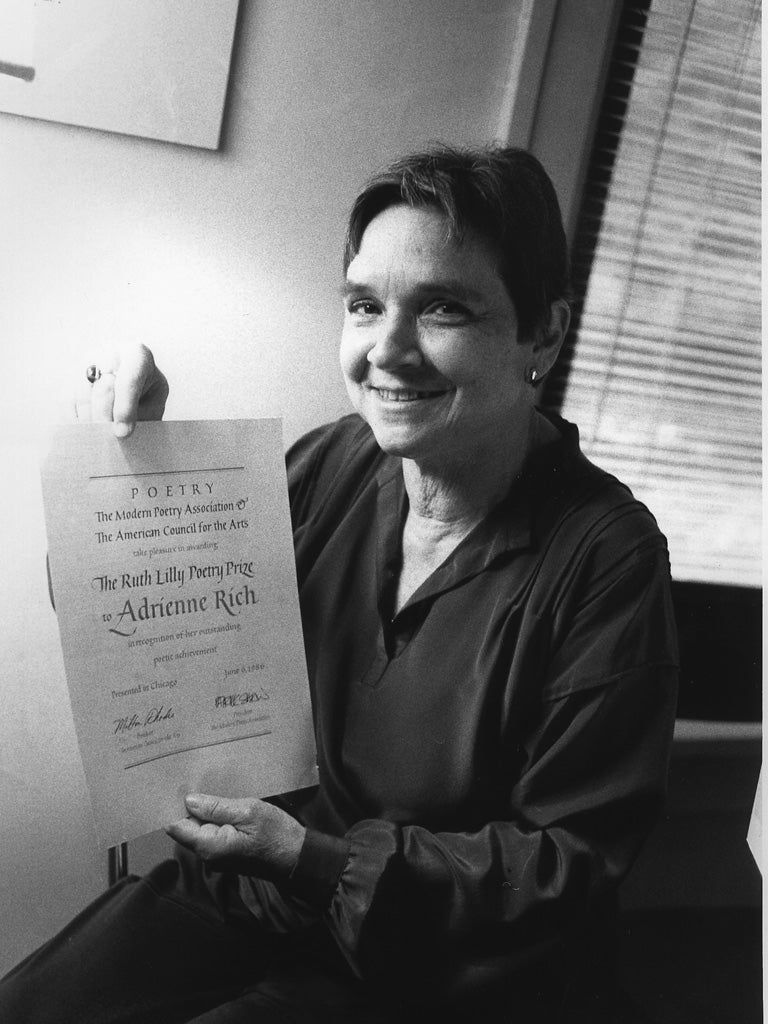Adrienne Rich: Poet whose work fused the personal and the political

Adrienne Rich was "one of the most widely read and influential poets of the second half of the 20th century", according to the Anthology of Modern American Poetry. The Oxford Companion to Women's Writing in the United States goes further, saying that "There is no writer of comparable influence and achievement in so many areas of the contemporary women's movement as the poet and theorist Adrienne Rich." Rich described herself succinctly as "a white woman, a Jew, a lesbian, and a United States citizen."
Rich was born in Baltimore in 1929 to Arnold Rice Rich, a pathologist, and Helen Jones Rich, a one-time concert pianist. Her father gave her "books about women writers and women painters" and introduced her to the work of Mary Wollstonecraft: "[He] taught me to write by giving me passages from Blake, Keats and Longfellow to copy out ... It was a natural progression from their words to words of my own."
Rich's own words soon brought her recognition as a poet of considerable potential. In 1951, aged 22, she won the Yale Younger Poets competition. Her first book of poems, A Change of World, was published that year as part of the award prize. The preface, by WH Auden, who had been on the judging panel, praised poems which were "neatly and modestly dressed, speak quietly but do not mumble, respect their elders but are not cowed by them."
This was also the year of her graduation from Radcliffe College. She won a Guggenheim fellowship which allowed her to travel and study at Oxford during 1952. A year later she married Alfred Conrad, a postgraduate economics student, who would go on to become a professor of economics at Harvard.
Sylvia Plath, her contemporary, sought to compare herself to Rich but recognised that she did not measure up to her peer's dynamism and outspokenness. Plath noted in a 1958 diary entry: "Adrienne Cecile Rich: little, round and dumpy, all vibrant short black hair, great sparkling black eyes and a tulip-red umbrella; honest, pink, forthright and even opinionated."
Like Plath's, Rich's verse, such as Snapshots of a Daughter-in-Law (1963), began to question the constrictions of the woman's role within the family: "Nervy, glowering, your daughter wipes the teaspoons, grows another way."
The couple moved to New York in 1966; Rich became increasingly politically active and signed the Writers and Editors War Tax Protest pledge, vowing to refuse to pay tax in protest against the Vietnam War. By now rejecting conventional family life and heterosexual relationships, she separated from her husband in early 1970. Conrad killed himself a few months later.
The collection Diving into the Wreck (1973) shows Rich at her peak as a poet, activist and thinker. On the book'sjacket she declared her aims as "...breaking down the artificial barriers between private and public, between Vietnam and the lover's bed, between thedeepest images we carry out of our dreams and the most daylight events 'out in the world'."
The last stanza of the title poem imagines the mermaid and "armoured" merman's journey into the bowels of a wrecked ship: "We are, I am, you are / by cowardice or courage / the one who find our way / back to this scene / carrying a knife, a camera / a book of myths / in which / our names do not appear."
This work was recognised the following year with the National Book Award for poetry, alongside Allen Ginsberg's The Fall of America, a collection which likewise challenged the American Dream. Rather than take the award as an individual, Rich shared it with her fellow nominees, Alice Walker and Audre Lorde, and accepted on behalf of all women writers.
In 1976 Rich began a lifelong partnership with the novelist Michelle Cliff and began to write and lecture extensively on sexuality and feminism. For her "The suppressed lesbian I had been carrying in me since adolescence began to stretch her limbs".
Her 1980 essay Compulsory Heterosexuality and Lesbian Existence condemned "a political institution which disempowers women" and questioned the systematic repression of lesbianism. Although she later clarified that she never intended it as a "manifesto or doctrine", it has remained an influential work on gender and sexuality. The term "compulsory heterosexuality" has been adopted by the gender theorist Judith Butler, among others.
When Rich was offered the National Medal of Arts in 1997, she refused, stating: "I could not accept such an award from President Clinton or this White House because the very meaning of art, as I understand it, is incompatible with the cynical politics of this administration. It means nothing if it simply decorates the dinner table of the power which holds it hostage."
Two biographies have been published during her lifetime: Adrienne Rich: the moment of change (2004), by Cheri Colby Langdell and The Aesthetics of Power: The Poetry of Adrienne Rich (1986), by Claire Keyes. Summarising Rich's development, Keyes writes: "In her early poems, Adrienne Rich accepts certain traditions associated with the divisions of power according to sex. Later, Rich continually defines and redefines power until she can reject power-as-force (patriarchal power) for the power-to-transform, which, for her, is the truly significant and essential power."
Marcus Williamson
Adrienne Cecile Rich, poet and activist: born Baltimore, Maryland 16 May 1929; married 1953 Alfred H Conrad (died 1970; three sons), partner to Michelle Cliff from 1976; died Santa Cruz, California 27 March 2012.
Join our commenting forum
Join thought-provoking conversations, follow other Independent readers and see their replies
Comments
Bookmark popover
Removed from bookmarks